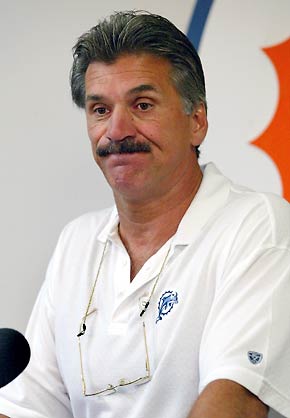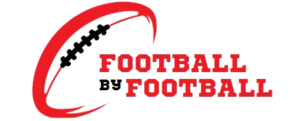In the NFL, job security is a daily battle. It doesn’t matter if you’re a rookie fighting to earn your spot, a middle-of-the-road veteran trying to keep playing, or a superstar quarterback with a legacy to protect; you must prove yourself every day.
Just take a look at Tom Brady. The pressure is incredibly intense when it comes to head coaches, and that’s exactly what’s happening in Oakland at the moment.
The recent termination of Raiders head coach Dennis Allen brought back memories of the only season in my career when my head coach was dismissed midseason.
Just three years after two successful playoff seasons in 2000 and 2001 with an 11-5 record, Dave Wannstedt’s job in Miami was on shaky ground.
I joined the team from Washington just before the 2002 preseason. In that season, we ended up with a 9-7 record but missed the playoffs because of a devastating loss in Week 17 to New England.
In 2003, we stepped up our game with a 10-6 record, but unfortunately, we still couldn’t secure a spot in the playoffs. Our defense was stacked with seven pro-bowlers in 2002.
On offense, we had the powerhouse Ricky Williams in his prime and promising talents like Chris Chambers and Randy McMichael.
Our quarterback was Jay Fiedler. Aside from my 2009 season with the Vikings, where Favre led us to the NFC Championship game, this was the most talented team I played with during my 12-year career.
The fans were well aware of the situation as well. Despite multiple playoff appearances and two winning seasons, there was significant pressure on Wannstedt even before the season began.
The chatter on local Miami radio was dominated by discussions of reaching the AFC Championship game or potentially sending out pink slips.
Players start to look around the league and analyze where some of their old coaches are at and if there may be openings next offseason.
In my view, Wannstedt’s midseason firing can be linked back to early February of that year. Norv Turner, our beloved offensive coordinator, left for the head coaching position with the Oakland Raiders.
The unique twist here was that the Raiders hired Norv quite late, long after filling other coaching vacancies. This departure put our team in a tough spot because most of the highly qualified offensive coordinators had already taken other jobs by then.
The most logical option for coordinator seemed to be our recently hired quarterbacks coach, Marc Trestman. Interestingly, he had just been let go from his role as the offensive coordinator with (you guessed it) the Oakland Raiders.
Trestman had a wealth of experience as a coordinator and had enjoyed considerable success in Oakland.
However, there was a catch – Trestman had primarily been involved in the West Coast system throughout his career and was not particularly familiar with Turner’s Don Coryell-style number system.
Throughout the offseason, we shuffled between coordinators not named Trestman, struggling to replicate Turner’s magic.
The season rapidly unraveled into a disaster when coupled with Ricky Williams’ retirement, departure, and drug suspension. It resembled a train wreck by midseason, and Wannstedt ultimately “resigned.”
Our defensive coordinator, Jim Bates, stepped up as head coach, a situation reminiscent of the current scenario in Oakland.
For the remainder of the season, everyone within the organization was under intense scrutiny.
Players, coaches, and staff members tiptoed on eggshells, hoping to show enough in the next three months to secure their positions for the following year.
While this pressure is a common theme in the NFL, it becomes even more intense during such moments.
Whenever there’s a head coaching change, the new coach often brings in their own staff, including coaches, players, and support staff.
Coaches prefer familiar faces who will be loyal to their program, adding immense pressure to the existing coaching staff. The interim head coach typically gets a chance to lead the team during this crisis, earning the first interview after the season ends.
Occasionally, they impress the owner or GM enough to secure the head coaching role for the following year, as seen with Jason Garrett in Dallas and Leslie Frazier in Minnesota. This is precisely where Tony Sparano stands.
For the assistants, their allegiances are no longer tied to the head coach who brought them in; they must prove their worth to the interim head coach while also showcasing their players’ performance to the rest of the league.
During this period, I observed many closed office doors and hushed conversations. Coaches are aware of the possibility of being let go in a few months and are preparing for their next job prospects.
Networking becomes a crucial aspect of coaching, and contact lists come into play in times like these.
There will be a lot of rumors and closed door conversations going on for the next 12 weeks in Oakland
As a player, I experienced many of these same feelings. Players begin to look around the league, contemplating the whereabouts of their former coaches and the potential openings in the upcoming offseason.
Despite our dire situation, we were fortunate to have Jim Bates as our new head coach. Defensive players adored him, and the offensive players respected him.
He was a no-nonsense coach who connected well with the players, motivating us to perform better and win.
We believed that if we played well, Bates had a genuine shot at becoming the head coach for the 2005 season, and many players would remain, given our team’s continued talent.
As a fourth-year player with no NFL starts, I found myself uncertain about the situation.
I liked Bates as the head coach, and since I always approached scout teamwork with dedication, I felt I had a good rapport with him.
Consequently, I was inclined to do my best to help Jim secure the head coaching position.
However, there were undoubtedly players on the team who believed we needed an offensive-minded head coach.
Our team’s strong emphasis on defense was a turnoff for some players, both from a talent and salary cap perspective. Nonetheless, our collective goal remained winning, echoing the sentiments of Nuke Laloosh: “Winning is like…better than losing.”

My approach during that period was to steer clear of any controversies and simply focus on my work ethic. I aimed to leave a lasting impression on our general manager, Rick Spielman, through my daily practice routines.
I strived to compete, hoping to catch the eye of any offensive coaches who might stay with the team or join another. To me, each day, each practice, every drill, and every meeting resembled a game situation. I wasn’t alone in this mindset, as many of my teammates shared a similar outlook.
I recall Junior Seau addressing the team, saying, “Guys, this team is going to look very different next year, so we might as well go out there, win some games, and enjoy each other’s company in the meantime.” I believe his words helped diffuse potential drama during that tumultuous time.
Under Bates’ guidance, our team made significant strides. Despite starting the season at 0-6 and acquiring a new coach with a 1-9 record, we ended the year on a relatively positive note, going 3-4.
This included a memorable Monday Night Football victory against New England, who later went on to win the Super Bowl.
Trestman assumed a more prominent role in the offense and kept our quarterbacks focused. When Jay Fiedler landed on injured reserve after Week 11, Jason Garrett came out of the Fox broadcast booth to join us as our third quarterback.
My first NFL start came in Week 17 against Baltimore. Although I faced challenges and struggles at times, I approached everyone with determination and made enough plays to impress a few individuals.
One of them was Garrett, who went on to become the Dolphins’ quarterbacks coach the following season.
Bates did not remain with the team, and we welcomed Nick Saban as our new head coach. However, my handling of the challenging situation earned me a return to the team during free agency.
Garrett played a significant role in my decision to come back, and his mentorship had a lasting impact on my career.
Currently, the players and coaches in Oakland find themselves in a similar situation. Over the next 12 weeks, there will likely be numerous rumors and confidential discussions, creating a bit of a soap opera atmosphere.
Many lives are on the cusp of change, and for most players, this is their first experience in such circumstances. My advice to them is simple: work hard and maintain a positive attitude.
Avoid getting entangled in the drama, and focus on competing every day to contribute to the team’s success.
Resist the urge to complain or quit, and don’t expect opponents to show sympathy. Instead, seize the opportunity, and when you look back, it will be a season you remember as a rough patch in your career rather than a dark cloud that overshadowed it.

